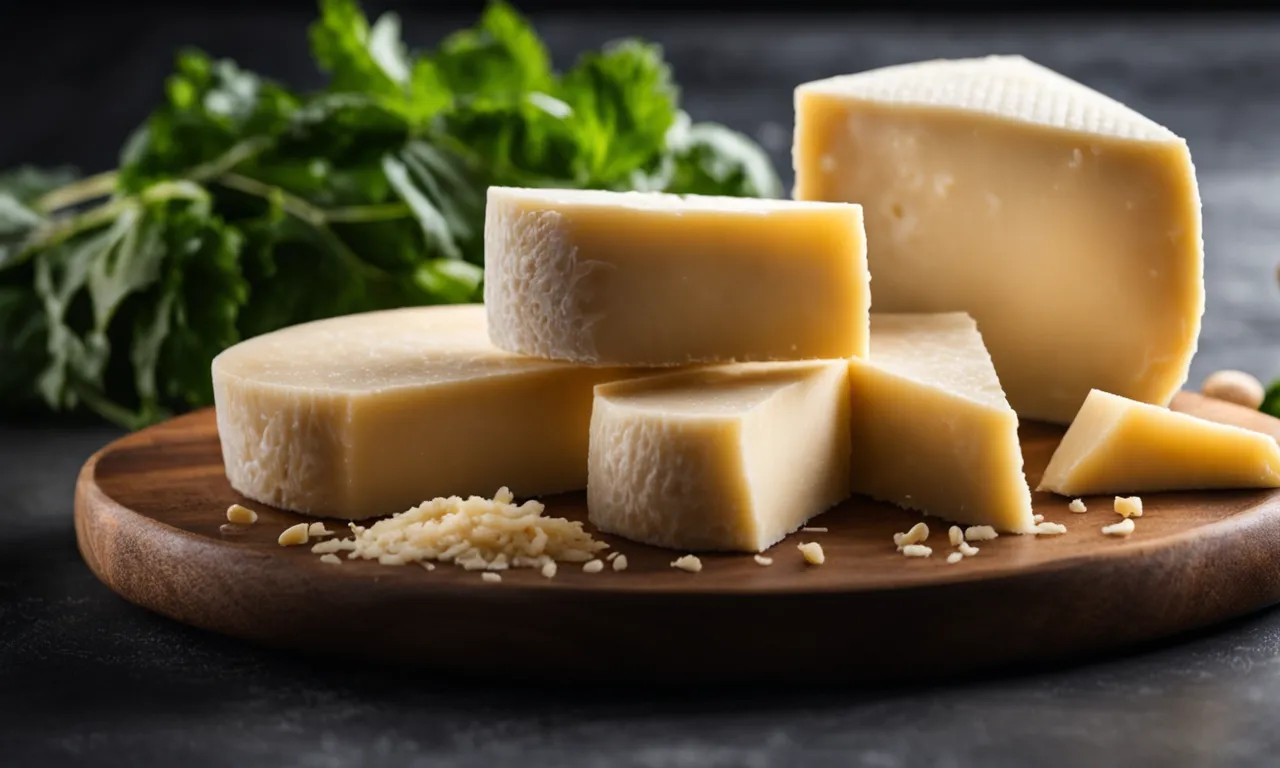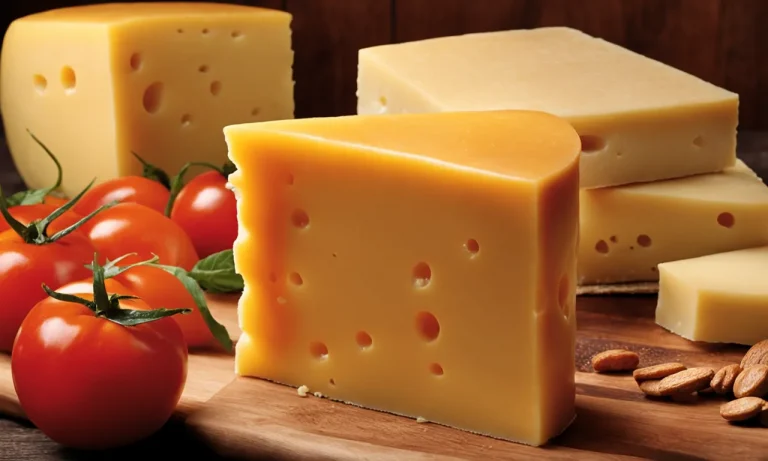Why Parmesan Cheese Isn’T Vegetarian
Parmesan is one of the most popular cheese varieties, known for adding a sharp, nutty flavor to pasta, salad, and more. But with its hard texture and ability to be finely grated, you may be wondering – is Parmesan cheese vegetarian?
The answer is no: true Parmesan cheese is not vegetarian due to one key ingredient – rennet.
In this comprehensive guide, we’ll explain what makes Parmesan non-vegetarian, describing the process of how real Parmesan is produced using animal rennet. We’ll also outline Parmesan cheese alternatives, from vegetarian ‘Parmesan’ made with microbial rennet to nutritional yeast flakes.
Whether you’re a lacto-ovo vegetarian eliminating rennet or just want to leave out animal products, read on to learn why Parmesan can’t be considered vegetarian.
Authentic Parmesan Uses Animal Rennet in Production
When it comes to Parmesan cheese, many people assume that it is suitable for vegetarians since it is made from milk. However, the truth is that authentic Parmesan cheese is not vegetarian-friendly. The reason behind this lies in the use of animal rennet during the production process.
Rennet Causes Milk to Coagulate into Cheese
Rennet is an enzyme that is essential for the production of cheese. It helps the milk coagulate and separate into curds and whey. This process is crucial for creating the unique texture and flavor of Parmesan cheese.
However, the use of animal rennet in traditional Parmesan production means that it is not suitable for those following a vegetarian diet.
Traditional Rennet Comes from the Stomach Lining of Calves
Traditional rennet used in Parmesan cheese production is derived from the stomach lining of young calves. This natural enzyme is extracted when the calves are slaughtered. While this may seem unsettling to some, it is an age-old practice that has been used for centuries in cheese making.
The enzymes in the calf’s stomach help break down the milk proteins and form the characteristic texture of Parmesan cheese.
According to a study conducted by the International Dairy Foods Association, approximately 80% of Parmesan cheese produced in Italy uses animal rennet.
Vegetarian ‘Parmesan’ Uses Microbial or Vegetable Rennet
For those who follow a vegetarian diet, there are alternatives available in the market that mimic the taste and texture of Parmesan cheese. These vegetarian-friendly versions are usually labeled as “Parmesan-style” or “vegetarian Parmesan.”
Instead of using animal rennet, these products use microbial or vegetable rennet, which is derived from non-animal sources.
It’s important to read the labels carefully to ensure that the Parmesan cheese you are purchasing is suitable for your dietary preferences.
What is Rennet and How is it Used in Cheesemaking?
When it comes to making cheese, one crucial ingredient that is often used is rennet. Rennet is a complex mixture of enzymes that play a vital role in the coagulation or curdling of milk. It is derived from the stomachs of young calves, lambs, or goats, making it a non-vegetarian ingredient.
The use of rennet in cheesemaking has been a tradition for centuries, but its origin and impact on vegetarian diets have raised concerns in recent years.
Rennet Contains Enzymes that Cause Milk Proteins to Coagulate
The enzymes found in rennet are particularly effective in causing the milk proteins, such as casein, to coagulate. This process is essential for the formation of curds, which are then pressed and aged to create cheese.
The primary enzyme in rennet, called chymosin or rennin, specifically targets the kappa-casein protein and causes it to form a gel-like substance. This gel traps the fat and water molecules, resulting in the separation of curds and whey.
This natural coagulation process gives cheese its unique texture and flavor. However, for those following a vegetarian diet, the use of rennet poses a problem as it is derived from animal sources.
Rennet Speeds Up the Cheese Making Process
Aside from its coagulating properties, rennet also plays a crucial role in speeding up the cheese-making process. Traditionally, cheesemakers relied on the natural enzymes present in the stomach lining of young animals to curdle the milk.
This process was time-consuming and required a significant amount of rennet.
However, with advances in technology, most cheesemakers now use commercially produced rennet. This rennet is often sourced from genetically modified yeast or plants, making it more readily available and less expensive.
The use of these alternative sources has helped to streamline the cheese-making process, allowing for increased production and efficiency.
Most Rennet Today Comes from Genetically Modified Yeast or Plants
With the growing demand for cheese, the availability of traditional animal-based rennet has become limited. As a result, the majority of rennet used in cheese production today comes from genetically modified sources.
Genetically modified yeast or plants are engineered to produce the same enzymes found in animal rennet, making them suitable alternatives.
While the use of genetically modified rennet has sparked debates regarding its safety and sustainability, it has become the norm in the cheese industry. Cheese manufacturers are required to disclose the source of their rennet on product labels, allowing consumers to make informed choices based on their dietary preferences.
Vegetarian Alternatives to Parmesan Cheese
Many people who follow a vegetarian diet are often disappointed to learn that Parmesan cheese is not considered vegetarian. This is because traditional Parmesan cheese is made using animal rennet, an enzyme derived from the stomach lining of young calves.
However, there are several vegetarian alternatives to Parmesan cheese that can provide a similar flavor and texture.
Nutritional Yeast Adds Savory, Umami Flavor
One popular vegetarian substitute for Parmesan cheese is nutritional yeast. Nutritional yeast is a deactivated yeast that is commonly used in vegan and vegetarian cooking for its savory, umami flavor. It has a slightly nutty and cheesy taste, which makes it a perfect substitute for Parmesan cheese.
Nutritional yeast is also a great source of vitamins, minerals, and protein, making it a healthy addition to any dish.
Unlike Parmesan cheese, nutritional yeast is completely plant-based and does not contain any animal products. It is typically sold in the form of flakes or powder and can be sprinkled on top of pasta, salads, popcorn, or any other dish where you would normally use Parmesan cheese.
Some people even enjoy mixing nutritional yeast with breadcrumbs to create a flavorful coating for baked dishes.
Vegan Parmesan Exists, but Taste Varies
If you are looking for a more authentic Parmesan cheese flavor, there are several vegan Parmesan alternatives available on the market. These products are typically made from a combination of nuts, seeds, nutritional yeast, and spices to mimic the taste and texture of Parmesan cheese.
It’s important to note that the taste and texture of vegan Parmesan can vary greatly depending on the brand and ingredients used. Some vegan Parmesan alternatives may have a stronger nutty flavor, while others may have a milder taste.
It’s always a good idea to read reviews or try different brands to find one that suits your preferences.
Other Hard Grating Cheeses May Use Vegetable Rennet
If you are specifically looking for a hard grating cheese that closely resembles Parmesan cheese, there are a few options available that use vegetable rennet instead of animal rennet. Vegetable rennet is derived from plants and is considered vegetarian-friendly.
One example is Grana Padano, an Italian cheese that is similar to Parmesan but is made using vegetable rennet. Grana Padano has a slightly milder flavor compared to Parmesan, but it can still be used as a substitute in many recipes.
Another option is Pecorino Romano, an Italian cheese made from sheep’s milk that also uses vegetable rennet.
It’s important to check the labels or ask the cheesemonger if a cheese is made with vegetable rennet to ensure it is vegetarian-friendly. Some brands may also clearly label their cheeses as suitable for vegetarians.
Conclusion
While delicious, most true Parmesan cheeses are made using animal-derived rennet, making them non-vegetarian. But by looking for vegetarian labeling or switching to nutritional yeast flakes, you can still enjoy the hard, savory flavor of Parmesan on pasta, pizza and more, without compromising your vegetarian diet.







